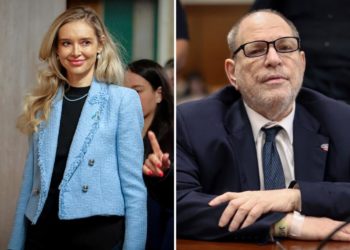A member of the board that oversees the U.S. Holocaust Memorial Museum wrote a blistering letter to the other board members on Friday condemning the silence of the institution after President Trump’s recent firings and invoking the lead-up to the Holocaust as he warned about the dangers of not speaking out.
In late April, Mr. Trump fired a number of board members appointed by former President Joseph R. Biden Jr., including Doug Emhoff, the husband of former Vice President Kamala Harris, as well as other former senior administration officials.
The firings were widely criticized as a shocking effort to politicize an organization dedicated to educating the world about one of the worst atrocities in history. But the museum’s statement at the time made no mention of the terminations and instead emphasized an eagerness to work with the Trump administration.
Kevin Abel, who was appointed to the museum’s board by Mr. Biden in 2023, wrote in his letter on Friday that Mr. Trump’s “campaign of retribution” had been met with troubling “public silence” by the museum.
Mr. Abel wrote that while it was “understandable” that museum leaders might fear speaking out at the risk of losing funding, it was vital to do so.
“At this juncture of rising threats and a swirling atmosphere of hatred, it is ever more imperative that the United States Holocaust Memorial Museum, the one institution that can most credibly call out the administration’s attack of its Council for what it is, not choose to remain silent,” Mr. Abel wrote, invoking Martin Niemöller’s words “about the danger of not speaking out,” which he noted were “inscribed on the wall of the Museum’s permanent exhibition.”
The message sparked a flurry of responses on Friday morning from fellow board members on a large email chain.
Mr. Abel wrote in his initial letter to other board members, “The dissonant message cannot be lost on us, however, when a Holocaust museum remains silent in the wake of acts of retribution and messages of hate emanating from an administration that has systematically torn at the fabric of our society’s protections and norms and has shown no sign of restraint in its enthusiastic promotion of uncivility.”
He went on: “The Holocaust teaches us that by using fear to buy silence, the Nazis were able to incrementally isolate, demonize, and then murder millions of Jews.”
Mr. Abel told the The New York Times in an email that he remained on the board and planned to stay unless his correspondence resulted in being pushed out. He declined further comment.
A representative for the museum did not immediately respond to a request for comment.
On the email chain, Daniel Huff, whom Mr. Trump appointed to the board in 2020, during his first term, objected to Mr. Abel’s invocation of Dietrich Bonhoeffer, an anti-Nazi dissident. Mr. Abel had quoted his famed line, “Not to speak is to speak. Not to act is to act.”
“Everyone is citing Bonhoeffer,” Mr. Huff wrote. “Ok, if anyone on here spoke up publicly when Biden broke the seal by dismissing Trump appointees from boards en masse in 2021 (e.g. Paul Packer from the American Heritage Commission), send me proof and I will personally call White House PPO and ask that you be reinstated. That is a bona fide offer.”
In 2021, a spokesman for the museum suggested to CNN that the removal of council members by a new administration would be unprecedented.
Another response to Mr. Abel came from Kimberly Marteau Emerson, who wrote that she had been one of the 13 members fired late last month. She said that she, too, was “deeply disappointed by the Museum’s resounding silence both publicly and internally.”
Ms. Emerson wrote that she had found herself thinking often about Thomas Mann, who she described as “the German intellectual whose public criticism of the Nazi regime led him to exile from Germany in 1933.”
“I have, in particular, considered his 1943 speech on BBC where he said, ‘Tolerance becomes a crime when applied to evil,’” she wrote. “Mann is challenging us to consider silence not as safety, but as moral risk. Silence is self-censorship framed as self-protection. But how do you draw the line between self-protection and moral abdication?”
The chain of emails prompted Stuart E. Eizenstat, the chair of the board, to weigh in.
“We are all appointed by the President and can be removed by the President,” he wrote, adding, “Communications like this can be counterproductive and could have unintended consequences that could hurt the Museum.”
Shane Goldmacher is a Times national political correspondent.
Katie Glueck is a Times national political reporter.
The post Holocaust Museum Board Member Condemns Silence on Trump Firings appeared first on New York Times.




